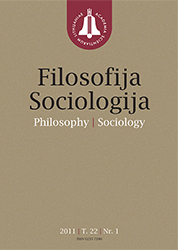Epilepsija sergančių asmenų į(si)galinimo ir užimtumo pajėgumų sąsajų vertinimas
The Evaluation of the Link Between Empowerment and Capability for Work of People Suffering from Epilepsy
Author(s): Laima Okunevičiūtė Neverauskienė, Sandra KrutulienėSubject(s): Psychology, Labor relations, Health and medicine and law
Published by: Lietuvos mokslų akademijos leidykla
Keywords: capability for work; capability approach; agency; empowerment; people suffering from epilepsy;
Summary/Abstract: Theoretical aspects of (self-)empowerment, in the background of capability approach, are presented in the article as well as the results of the empirical research which analyse peculiarities of (self-)empowerment and its connection with employment (capability for work) of people suffering from epilepsy. According to the results of this research, a significant part of people suffering from epilepsy do not consider themselves as the rulers of their own life. They also believe their rate of (self-)empowerment is low. In addition, people suffering from epilepsy estimate the subjective control while making personal choices (and controlling their own life in general) as low. A bigger part of them would like to make some changes although only one out of two feels responsible for those changes. People suffering from epilepsy tend to believe that their influence on activities in society would be low. Employment capability has a significant connection with the empowerment indicators of people suffering from epilepsy. The empowerment indicators of employed people suffering from epilepsy were significantly higher compared to the same indicators of capability for work of unemployed people suffering from epilepsy as well as with persons without capability for work. A tendency of a higher empowerment evaluation of employed persons can be noticed in all of the estimated fields: (self-) empowerment as a control, (self-)empowerment as a choice, (self-)empowerment as a change and (self-)empowerment in a society.
Journal: Filosofija. Sociologija
- Issue Year: 30/2019
- Issue No: 2
- Page Range: 139-148
- Page Count: 10
- Language: Lithuanian

